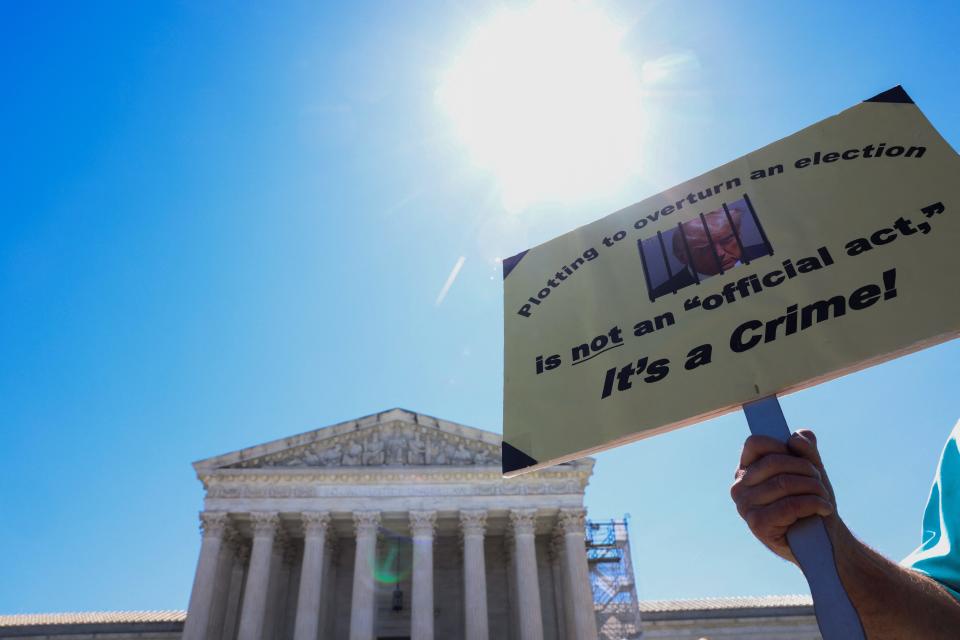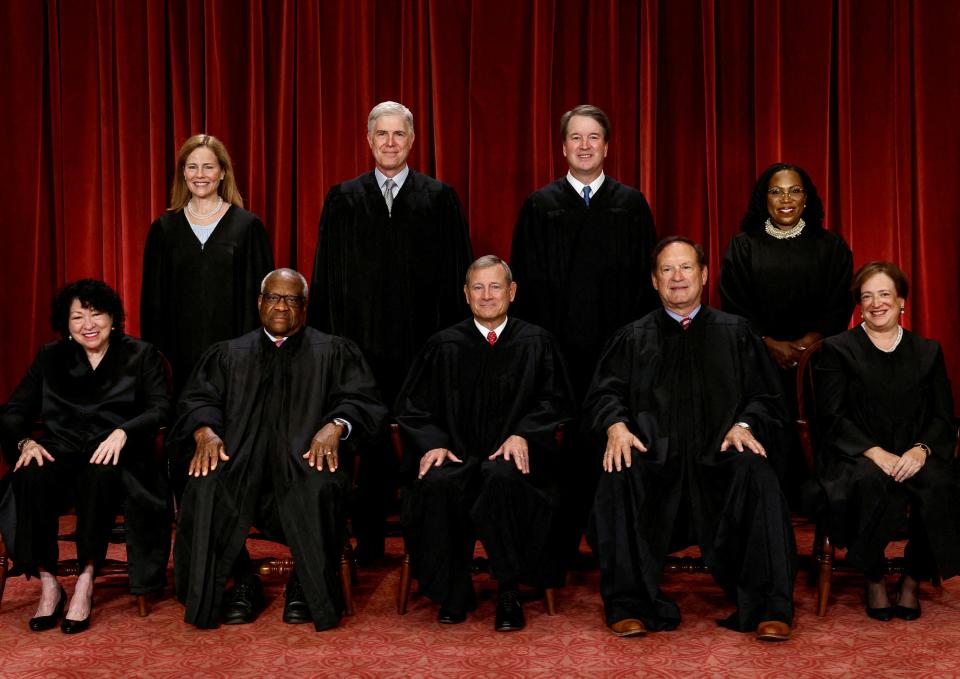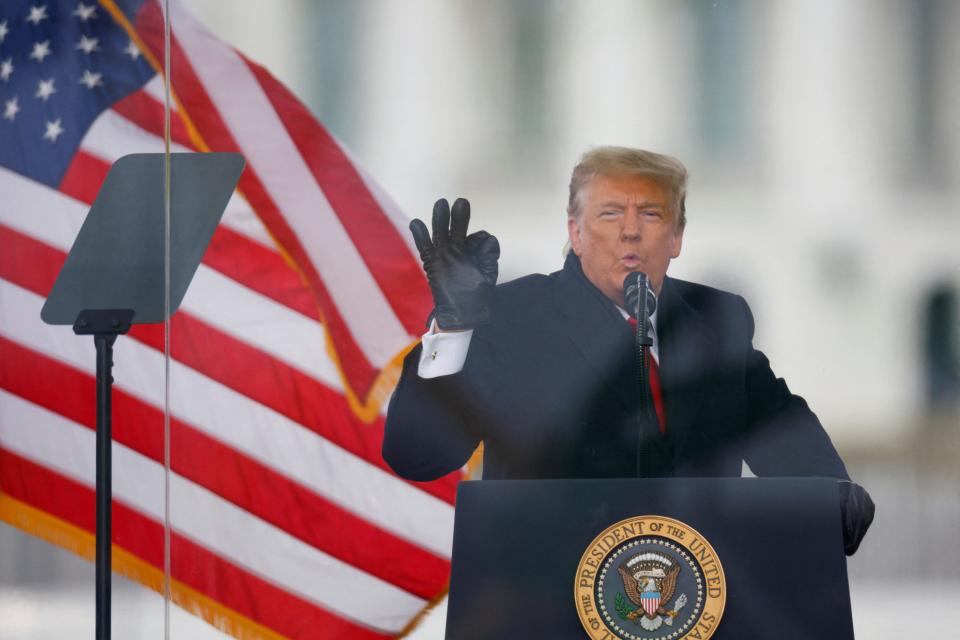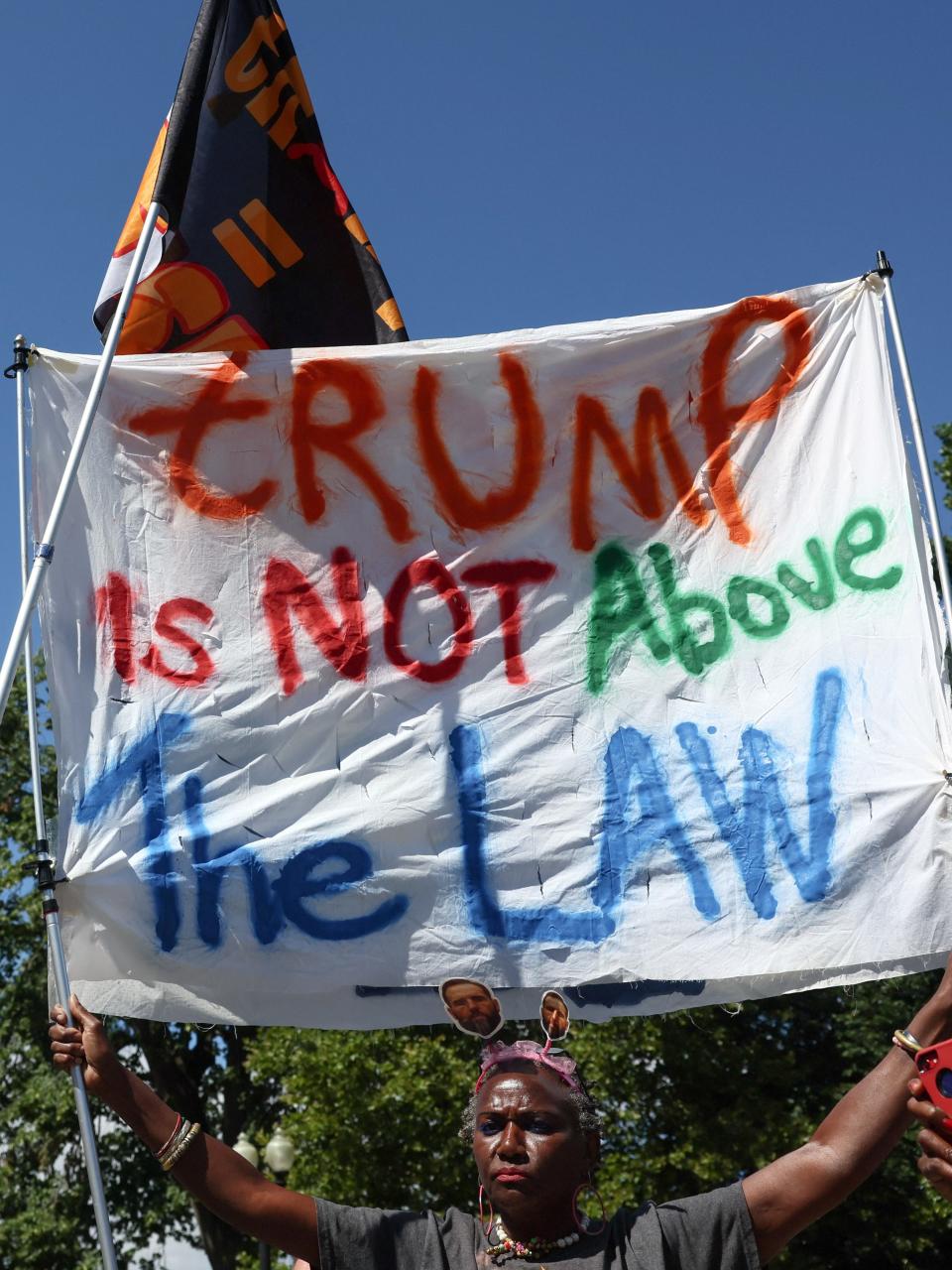Is Trump immune from charges because he was president? Supreme Court forces lengthy review
WASHINGTON – The Supreme Court’s broad finding of immunity for former President Donald Trump’s official acts shocked legal experts who said it could delay his federal trial a year as courts sort out what charges can stand amid allegations he tried to steal the 2020 election.
Chief Justice John Roberts wrote for the 6-3 ideological majority that lower courts must determine which of Trump's actions were taken in his official capacity as president, and which were unofficial − and open to prosecution.
“We conclude that under our constitutional structure of separated powers, the nature of Presidential power requires that a former President have some immunity from criminal prosecution for official acts during his tenure in office,” Roberts wrote. "As for a president's unofficial acts, there is no immunity."
Trump declared the decision a “big win for our constitution and democracy” in an all-caps post on Truth Social.
More: Supreme Court presidential immunity ruling shakes up the Biden-Trump conversation
The ruling directed U.S. District Judge Tanya Chutkan to analyze the indictment to determine whether any of the charges are for official acts to which Trump is immune. One justice suggested reviewing whether the prosecutor was appointed legitimately and a footnote invited a review of an obstruction charge the court narrowed in a decision Friday.
Justice Department special counsel Jack Smith’s team of prosecutors has argued the charges are based on private actions because they were aimed at overturning election results. But Trump has argued his complaints about alleged fraud were part of his official duties to ensure election integrity.
Michael Waldman, a constitutional law expert and CEO of the Brennan Center for Justice, said the judicial review of charges could take a year. David Becker, a former senior trial attorney in the voting section of the Justice Department’s civil rights division, called the decision “deeply disturbing” and “really striking” for the protection it offers presidents.
“The way I read this opinion is it could be a road map for (presidents) seeking to stay in power,” said Becker, executive director of the Center for Election Innovation and Research. “It could put into question whether or not future peaceful transfers of power occur.”
More: In historic ruling on presidential immunity, Supreme Court says Trump can be tried for private acts

Lengthy hearings expected to determine valid charges against Trump
The indictment of two obstruction counts and two conspiracy counts broadly alleges that Trump sought to overturn the results of the 2020 election. The allegations include:
Conspiring to obstruct Congress meeting Jan. 6, 2021, to certify President Joe Biden as the election winner.
Attempting to leverage the Justice Department’s power to convince states to replace their legitimate presidential electors with fraudulent slates
Meeting with the then-acting Attorney General Jeffrey Rosen to discuss investigating purported election fraud and threatening to replace Rosen.
Attempting to enlist Vice President Mike Pence to accept fraudulent electoral ballots in his role as president of the Senate while Congress certified the vote.
Roberts wrote that deciding how to apply immunity in Trump’s case “raises multiple unprecedented and momentous questions about the power of the President.”
More: Supreme Court sends GOP-backed social media cases back to lower courts in moderation fight
Trump’s discussions with his acting attorney general are official and can’t be part of the prosecution but his interactions with Vice President Mike Pence and others “present more difficult questions,” Roberts wrote, leaving the issue to the lower courts to tackle. But in doing so, Roberts admonished, courts “may not inquire into the President’s motives.”
And, in Pence’s case, Trump’s attempt to pressure his vice president to interfere with Congress’ electoral count “is at least presumptively immune from prosecution.”
“It is ultimately the Government’s burden to rebut the presumption of immunity,” he wrote.
Justice Clarence Thomas, in an opinion agreeing with Roberts, seemed to question whether Justice Department special counsel Jack Smith is a legitimate prosecutor for the case.
“If this unprecedented prosecution is to proceed, it must be conducted by someone duly authorized to do so by the American people,” Thomas wrote. “The lower courts should thus answer these essential questions concerning the Special Counsel’s appointment before proceeding.”
In a footnote, the justices also invited lower courts to review the obstruction charge in Trump’s election interference case after a Friday ruling narrowed the charge. Trump has argued the indictment stretches that charge “far beyond its natural meaning.”

Trump's lawyer acknowledged private conduct in indictment
Trump’s lawyer, John Sauer, conceded during the oral argument in April that the former president would be vulnerable to charges for private acts.
Justice Amy Coney Barrett rattled through a list of allegations in the indictment and asked whether they sounded public or private. In one episode, she asked whether the defendant allegedly conspiring with a private attorney to file false allegations to support a court challenge to election results was private.
“That also sounds private,” Sauer said.
More: Trump aide Steve Bannon reports to federal prison for defying House Jan. 6 subpoena
Barrett asked whether the defendant allegedly directing an effort by two private lawyers to submit fraudulent slates of electors to obstruct the certification of the election sounded private.
“That’s private,” Sauer said.
But he also argued it was “absolutely an official act for the president to communicate with state officials” about election integrity, citing as precedent President Ulysses Grant's decision to send federal troops to Louisiana and Mississippi to ensure Republican electors were certified in the years after the Civil War.

No Trump trial before election: legal experts
Legal experts said hearings to determine what charges can stand against Trump will move any trial beyond the Nov. 5 election.
"The Supreme Court has put out a fact-intensive test on the boundaries of the president's immunity − with a huge thumb on the scale favoring the president's immunity − in a way that will surely push this case past the election," said Rick Hasen, a law professor at UCLA.
Georgetown University law professor Erica Hashimoto said it would take a while to sort out the opnion and how it applies.
"No chance of a pre-election trial," Hashimoto said.
More: Trump appeals to some Black voters more concerned about economy than attitude
Becker said even if a lower court says Trump’s request that Georgia Secretary of State Brad Raffensperger “find” enough votes to win the election is not an official act, that might be overruled on appeal to the Supreme Court.
“The degree to which that immunity falls on the president is really striking for me,” Becker said.
Waldman said former President Richard Nixon paying hush money to Watergate burglars or offering clemency to one of the conspirators could be considered official acts, under the court's logic. He estimated sorting out what Trump can be charged with could take another year.
“The facts are easy: Trump is not immune from conspiring to overthrow the Constitution’s peaceful transfer of power, even if he worked with other government officials to do it,” Waldman said.

SEAL Team 6 assassinations or 'chilling doom': Justices vigorously disagreed about impact of ruling
Justice Sonia Sotomayor strongly disagreed with the majority opinion, saying the ruling would allow a president to order SEAL Team 6 to assassinate a political rival, organize a military coup to hold onto power or accept a bribe in exchange for a pardon.
"Even if these nightmare scenarios never play out, and I pray they never do, the damage has been done," Sotomayor wrote. "In every use of official power, the President is now a king above the law."
Roberts criticized the dissenters for not acknowledging the lower courts will determine whether Trump’s conduct is vulnerable to criminal charges.
“As for the dissents, they strike a tone of chilling doom that is wholly disproportionate to what the Court actually does today – conclude that immunity extends to official discussions between the President and his Attorney General, and then remand to the lower courts to determine ‘in the first instance’ whether and to what extent Trump’s remaining alleged conduct is entitled to immunity,” Roberts wrote.
This article originally appeared on USA TODAY: Supreme Court forces lengthy review of charges against Donald Trump


